Leadership in African Culture. Between Fear and Respect.
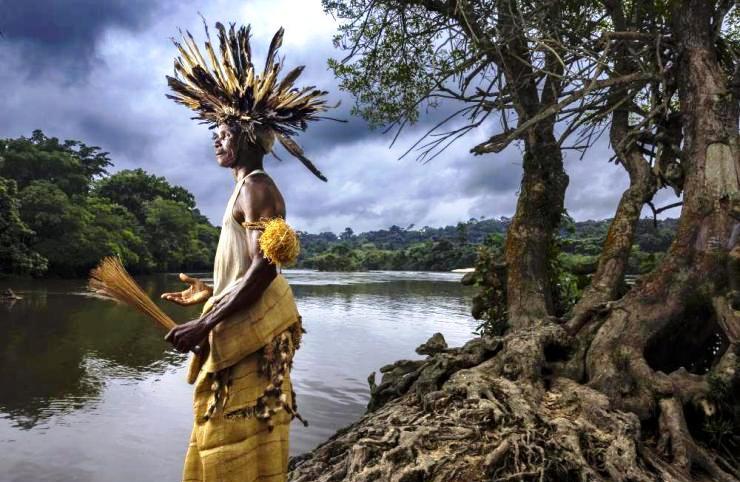
African traditional political leaders cover both the temporal and the religious spheres. They represent the exigencies of the ancestors before the community of the living and the exigencies of the same community before the ancestors.
This double responsibility before the people and before the ancestors confer on them both authority and power. The Congolese philosopher Nkombe Oleko explains the relations between the chief and his people using two Tetela proverbs, an ethnic group of the Democratic Republic of Congo: “The chief is a leopard, he is not afraid of anybody”; “All have neighbours but the ear lives alone”.
The first character of the chief is his incontestability. Once one is invested with authority, he is placed in an incontestable relationship with others. He has to impose himself on the others and to inspire fear and respect. His authority is exercised over all the people. He knows neither preferences nor discrimination. The incontestable character that power gives him isolates him from the others. The chief is a lonely man.
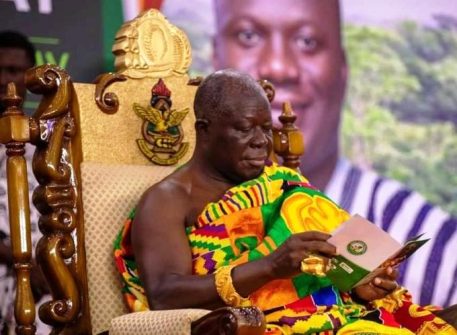
Otumfuo Osei Tutu II Asantehene, the King of the Asante Kingdom. “People regard them as God’s earthly viceroys” Photo: The Kingdom of Asante
While the lion is the king in the savannah, the leopard is the king in the forest zones but the idea behind the two symbols of power is the same. Africans in general see in their chief a force that enables a man to dominate others. It confers on him both nobility and the right to govern. The same force enables him to keep order in society and in the cosmos, making him a priest of its cult.
However, other Tetela proverbs are there to show that despite the general submission to the chief (Ears [human] do not rise above the head), things are not all that smooth. A goat does not eat the leaves imposed on it by force. There is a tendency to contest the incontestable as a manifestation of freedom.This contestation of authority has two faces: the refusal to be dominated by the other and the exigency of participation and reciprocity in authority.
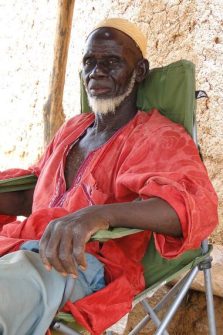
The head chief of a village in Burkina Faso. CC BY-SA 3.0/Adam Jones
According to Nkombe Oleko, what the muntu looks for in his relations with his superiors is the establishment of a conscious educative circle, in which everyone is instructed by contact with the other and in which the act of hetero education is not the monopoly of one person. When this is achieved, authority is modified. It is no longer an egocentric power of self-valorisation at the detriment of the other; it does not suffocate donation, acceptance and respect anymore the freedom of the other.
It becomes as John Samuel Mbiti, a Kenyan philosopher, notes African kings are not simply political heads, they are mystical and religious heads. Thus, they are divine or sacral rulers, the shadow or reflection of God’s rule in the universe.
People regard them as God’s earthly viceroys. However, despite all the qualities attributed to them, Kings belong to the category of shameful and impure beings. They become monsters whose personality has been violated by, and in favour of, power. If we take into account the royal incest and the fact that some kings used to be anointed with human blood, as the anthropologists Louis-Vincent Thomas and René Luneau pointed out investiture pushes the king out of normal human relations giving him the solitude proper to wizards.
This monstrosity needed in order to face the equally monstrous powers inherent in the universe is a kind of positive wizardry meant to protect the people and protection goes hand in hand with the king’s quality
as father of his people. The Baganda, the ethnic group in Central Uganda, call their king Goats are sacrificed a hen a large family or clan is at risk, but when the whole tribe is attacked by sickness or any form of common enemy, it is a bull.
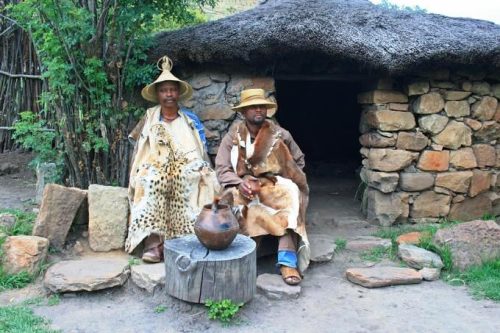
Traditional Basotho chief. “The first character of the chief is his incontestability”. Photo: Pixabay
‘Nnamunswa’ (queen ant) and the Tetela people refer to their chief as the ‘mother hen’ who covers her chicks. Authority is hereby associated with paternity and maternity. The aim of this authority is the protection of all the subjects from external and internal dangers.
Paternity then counterbalances monstrosity bringing about the ambivalence Africans perceive in political power as it is sung by the people Mossi of Benin to their new king immediately after his investiture: “You are a heap of dung! You are a heap of rubbish! You come to kill us; you come to save us!” “The qualities of the king are always raised to the highest degree and so his negative aspects”. He is, as it were, the human dispenser of these qualities for all his subjects.
The person of the king is so important that when a Murundi (from Burundi) would say: Gir’umwami (literally meaning, have the king!), he would wish that the inner personality of the king may possess his interlocutor; that his interlocutor may participate more fully in the life of the monarch Leadership implies interdependence.
“The face does not grow fat without the cheeks”. Nkombe Oleko applies this Tetela proverb to authority.
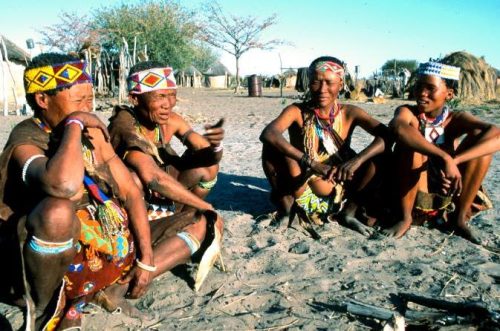
The San are the oldest inhabitants of Southern Africa. “The chief is a lonely man”. File swm
Thus, without his subjects, the chief cannot be chief. Authority is not at the service of one’s own self. Its paternal dimension essentially puts it at the service of others. The chief, in virtue of his ‘being head,’ depends on his subjects. In African thought, power is the principle of participation in communal life. Every individual, from the king or chief to the latest initiate has power in a given field thanks to his or her ontological, physical, intellectual, spiritual, and moral qualities. But all of them, specialists and ordinary citizens, young and old, men and women, participate in the same power invested in the ruling organ. (Open Photo:Gabon. Village Chief Jerome Likassou is seen in his traditional wear. © Brent Stirton/Getty Images for FAO, CIRAD, CIFOR, WCS)
Edward Kanyike



